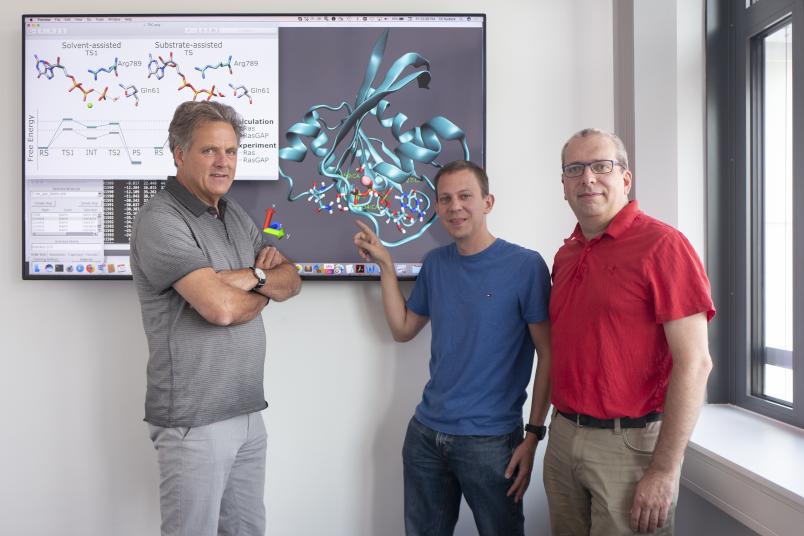
Biophysics
New deactivation mechanism for switch proteins detected
For decades, researchers have been debating over which of two mechanisms deactivates switch proteins. Now, a third scenario has emerged.
A new mechanism for the deactivation of switch proteins has been identified by researchers from Ruhr-Universität Bochum, headed by Professor Klaus Gerwert and Dr. Till Rudack from the Department of Biophysics, and the University of Uppsala in Sweden. Switch proteins such as Ras regulate many processes in the body and affect diseases such as cancer. The research team published their report on the newly discovered mechanism in the current issue of the Journal of the American Chemical Society, JACS, on 10 July 2019.
Ultra-accelerated reactions
Bound to switch proteins, the GTP molecule is vital for the deactivation of many of them. If one of the three phosphate groups is detached from GTP, the protein switches to “off”, thus affecting cellular processes. “The proteins are extremely efficient and accelerate reactions that would usually take billions of years so that they are executed within the fraction of a second,” says Klaus Gerwert.
At least one water molecule is always involved in the deactivation process. To date, researchers assumed that this water molecule had to be activated – namely by a reaction partner transferring a proton to the water molecule. “The nature of the reaction partner has been argued for decades – is it the GTP itself or is it a protein component,” explains Carsten Kötting, one of the authors from the Bochum-based team. “In the current study, we have surprisingly identified an entirely new mechanism, where the activation takes place without any proton transfer whatsoever.”
Theory versus experiment
Using computer-aided analysis, the team studied all deactivation options for seven different switch protein systems. The researchers thus identified various speeds for the deactivation process. They compared the calculated speeds with values gained in experiments through time-resolved infrared spectroscopy.
While the values for the two previously suspected mechanisms deviated strongly from each other, the experimental results for the newly identified mechanism corresponded with theoretical assumptions – for all seven tested systems, at that. “The matches show that our newly discovered deactivation mechanism is universal and, consequently, is relevant for numerous cellular processes,” concludes Till Rudack.
Mechanism relevant for tumour formation
“Diseases are often caused by a defect in the deactivation mechanism of key proteins,” says Till Rudack. “In order to understand the molecular processes underlying diseases and to develop therapies, we have to understand the deactivation mechanism first.”
The newly identified deactivation mechanism is, for example, responsible for switching Ras off, a protein whose defects result in uncontrolled cellular growth in tumours. Researchers have been trying for decades to find a drug that affects the dysfunctional Ras protein in human tumours. “We expect that our results explain why the search has remained fruitless to date,” says Klaus Gerwert. “The correct molecular deactivation mechanism can now become the starting point for the development of anti-cancer drugs.”